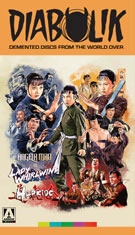
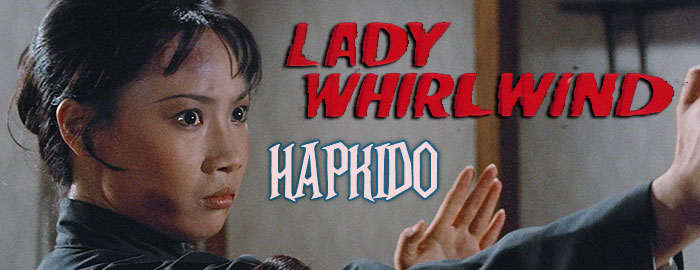
LADY WHIRLWIND
Color, 1972, 88 mins. 57 secs.
Directed by Haung Feng
Starring
Angela Mao, Chang Yi, Pai Ying
HAPKIDO
Color, 1973, 97 mins. 29 secs.
Directed by Feng Huang
Starring Angela Mao, Carter Wong, Sammo Hung
Arrow Video (Blu-ray) (US RA HD), Eureka (Blu-ray) (UK RB HD), Fortune Star (DVD) (Hong Kong R1 NTSC), Shout! Factory (DVD) (US R1 NTSC) / WS (2.35:1) (16:9)
In the wake of the major studio 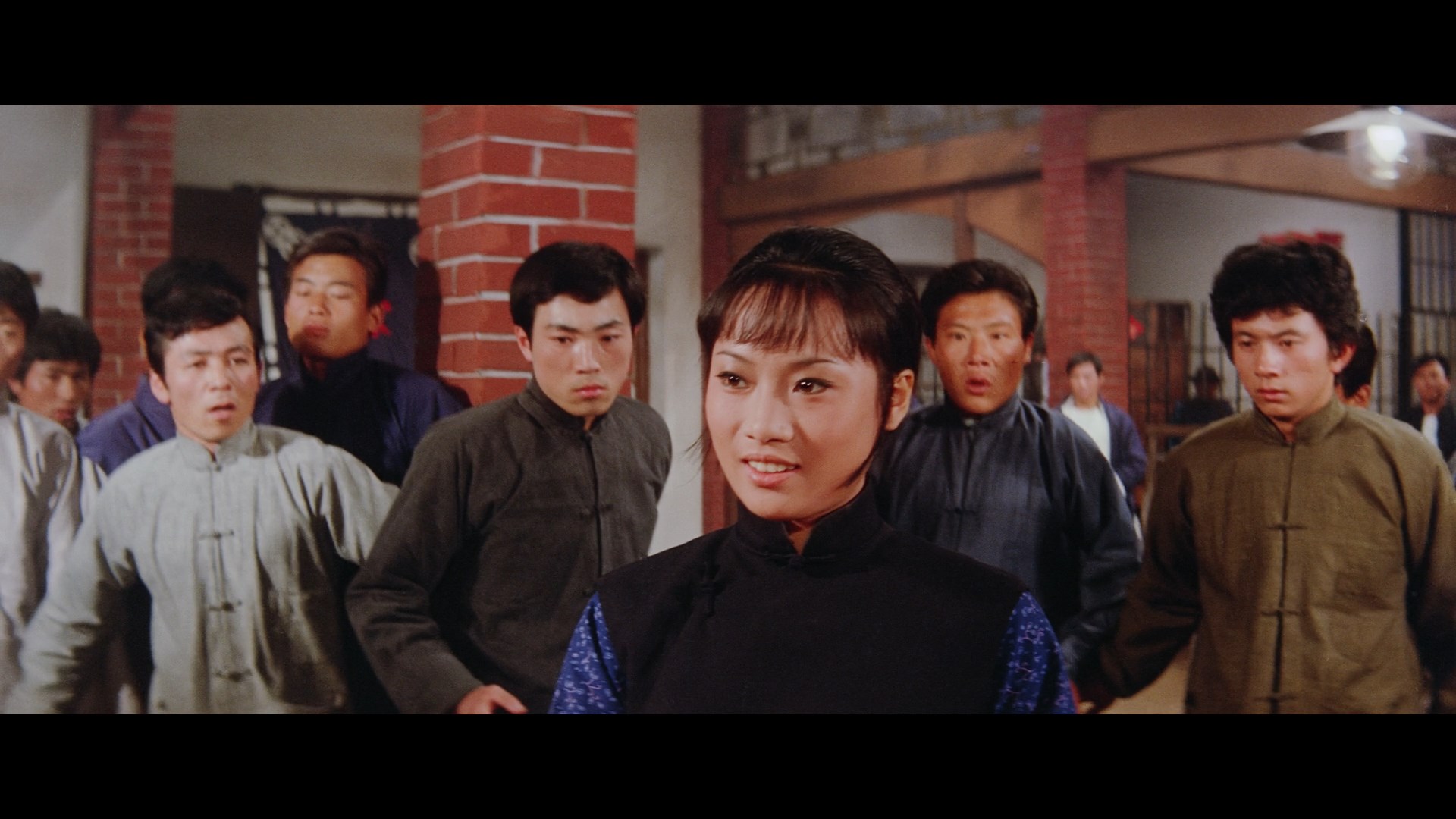 international smash Enter the Dragon and its posthumous cementing of
international smash Enter the Dragon and its posthumous cementing of 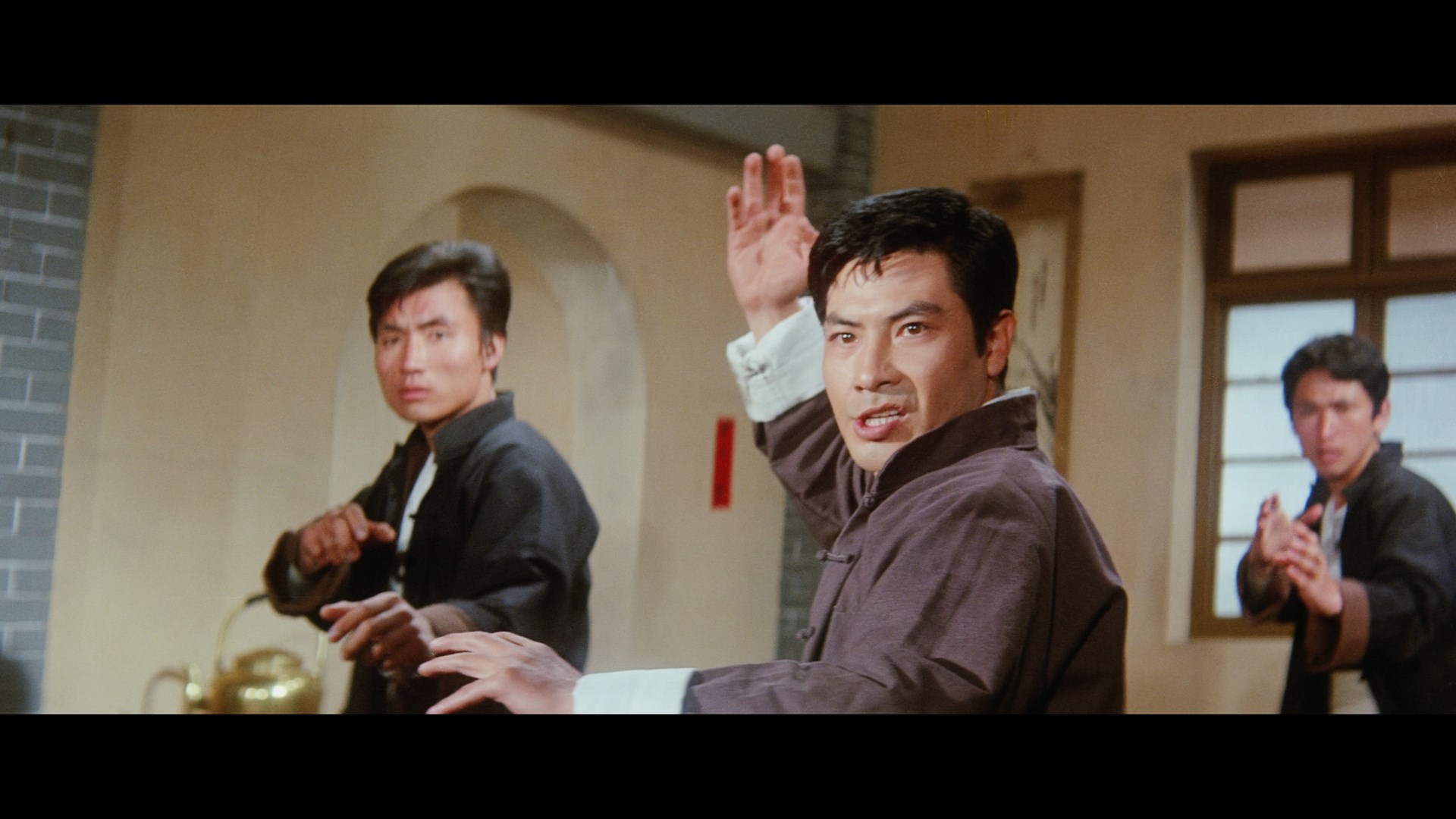 Bruce Lee as an all-time screen legend, seemingly everyone involved with the film seemed to be brushed with cinematic gold dust for a while. That was definitely the case for Angela Mao, who steals a lengthy chunk of the film in an action-packed flashback as Lee's ill-fated sister fending off an army of attackers. One of the first major female martial arts stars and an early adopter of hapkido, the Taiwanese actress parlayed her discovery by producer Raymond Chow into a successful career (including multiple stints opposite a young Jackie Chan) before retiring in the early '80s and moving to America. The year of Enter the Dragon's release, 1973, saw a slew of Mao releases like When Taekwondo Strikes, Thunderbolt, and Deadly China Doll, and two of her most popular vehicles have been given the deluxe special edition treatment on Blu-ray from Eureka in the U.K. and Arrow Video in the U.S. with new 2K restorations by Fortune Star.
Bruce Lee as an all-time screen legend, seemingly everyone involved with the film seemed to be brushed with cinematic gold dust for a while. That was definitely the case for Angela Mao, who steals a lengthy chunk of the film in an action-packed flashback as Lee's ill-fated sister fending off an army of attackers. One of the first major female martial arts stars and an early adopter of hapkido, the Taiwanese actress parlayed her discovery by producer Raymond Chow into a successful career (including multiple stints opposite a young Jackie Chan) before retiring in the early '80s and moving to America. The year of Enter the Dragon's release, 1973, saw a slew of Mao releases like When Taekwondo Strikes, Thunderbolt, and Deadly China Doll, and two of her most popular vehicles have been given the deluxe special edition treatment on Blu-ray from Eureka in the U.K. and Arrow Video in the U.S. with new 2K restorations by Fortune Star.
First up is Lady Whirlwind, amusingly retitled Deep Thrust for some of its dubbed U.S. engagements by AIP when lots of films had the word "Deep" shoved into their titles to cash in on the Deep Throat phenomenon. It's essentially a kung fu meets mobster story (with an early supporting role for another Enter the Dragon alum to boot, Sammo 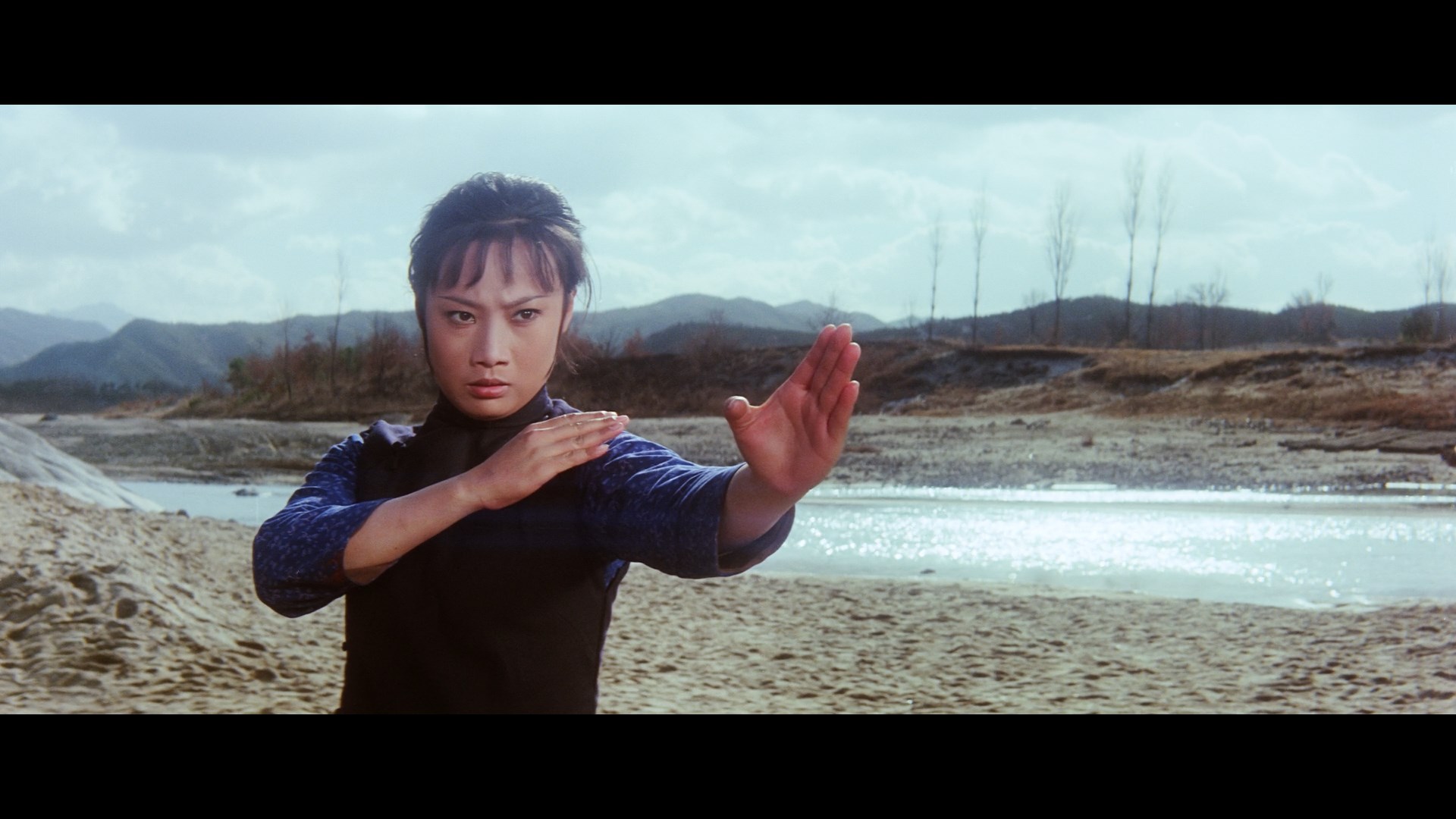 Hung) as organized crime is ruling a town with an iron fist including its latest victim, Ling (Yi), who's beaten senseless and vows payback. That proves extremely complicated with the appearance of Tien (Mao), whose sister killed herself after being
Hung) as organized crime is ruling a town with an iron fist including its latest victim, Ling (Yi), who's beaten senseless and vows payback. That proves extremely complicated with the appearance of Tien (Mao), whose sister killed herself after being 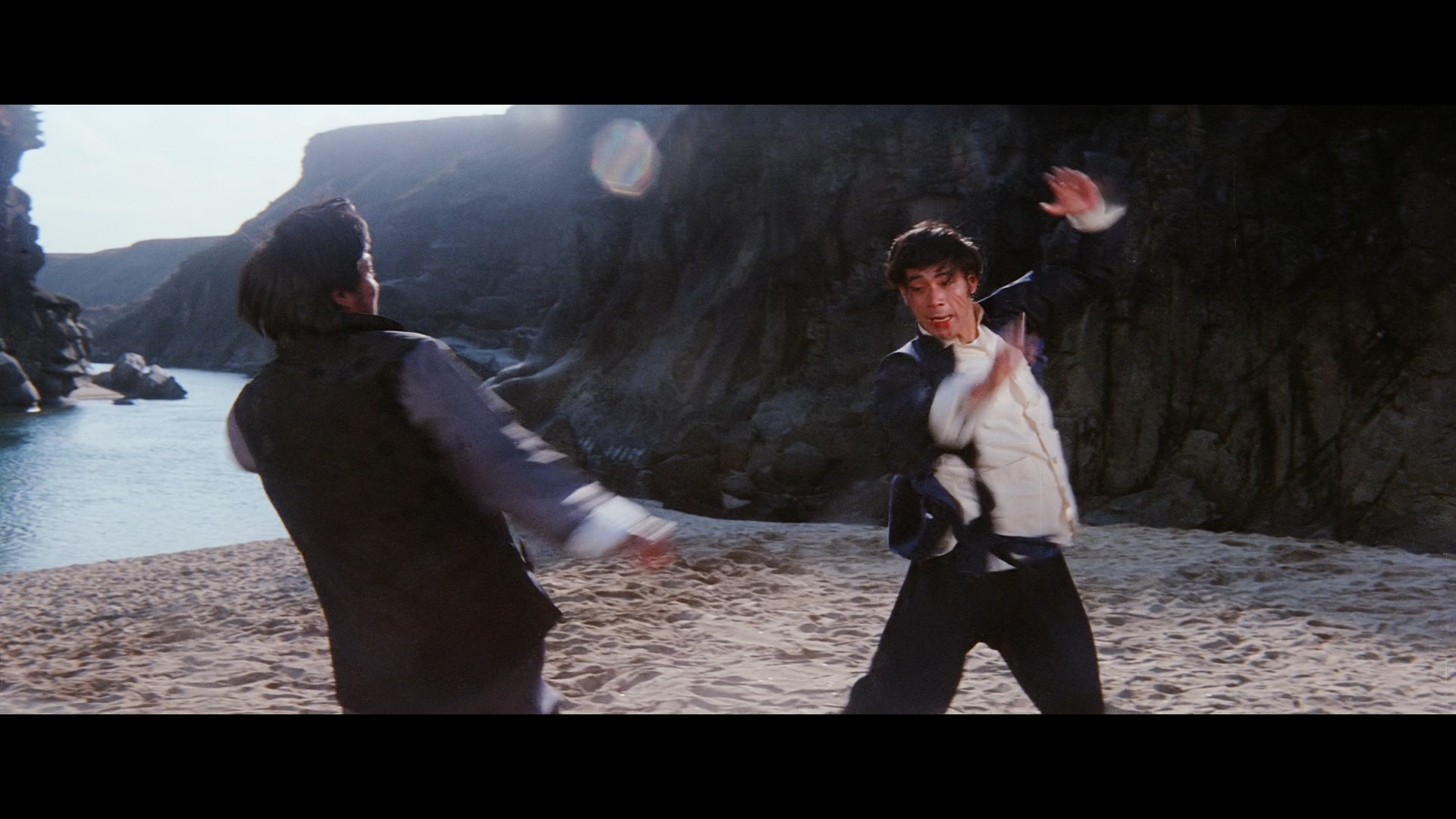 dumped by Ling. Now she's determined to make him pay with his life, but he talks her into holding off until his own quest for satisfaction is completed. Cue the showdowns, conflicted loyalties, and inevitable finale in which Tien has to decide whether to fulfill her own vow. It isn't hard to see why this one got exported so widely since it ticks off all the martial arts '70s boxes with a fight scene every ten minutes or so, with no visual or narrative innovations in sight to get in the way. It's also worth noting that this was shot with what look like outdated anamorphic lenses, similar to what you'd see in early CinemaScope titles, with actors on the periphery of wide shots looking very squeezed and occasional inherent focus issues popping up. That's a shortcoming inherent in the original film, so any widescreen version since then has had it. Also worth noting is the patchwork soundtrack, which is stranger than usual thanks to its generous recycling of Michel Legrand's score for The Picasso Summer.
dumped by Ling. Now she's determined to make him pay with his life, but he talks her into holding off until his own quest for satisfaction is completed. Cue the showdowns, conflicted loyalties, and inevitable finale in which Tien has to decide whether to fulfill her own vow. It isn't hard to see why this one got exported so widely since it ticks off all the martial arts '70s boxes with a fight scene every ten minutes or so, with no visual or narrative innovations in sight to get in the way. It's also worth noting that this was shot with what look like outdated anamorphic lenses, similar to what you'd see in early CinemaScope titles, with actors on the periphery of wide shots looking very squeezed and occasional inherent focus issues popping up. That's a shortcoming inherent in the original film, so any widescreen version since then has had it. Also worth noting is the patchwork soundtrack, which is stranger than usual thanks to its generous recycling of Michel Legrand's score for The Picasso Summer.
The second Blu-ray is devoted to Hapkido, also shown as Lady Kung Fu and featuring a much larger role for Sammo Hung (who also served as a fight coordinator on both films). This time it's a variation on the "let's set up a martial arts school" plot any self-respecting fan of these films knows very well, this time earning a special place in the history books for its small unnamed roles for Jackie Chan, Corey Yuen, and Yuen Biao as students. Here the action takes place in 1930s China where Yu Ying (Mao) and her two best friends from school, Kao Chang (Wong) and Fan Wei (Hung), have just graduated from school in Korea. Before heading home, they incur the wrath of some Japanese thugs who turn out to be the opening volley in a chain of Japanese attempts to shut down their fledgling hapkido academy. Eventually things 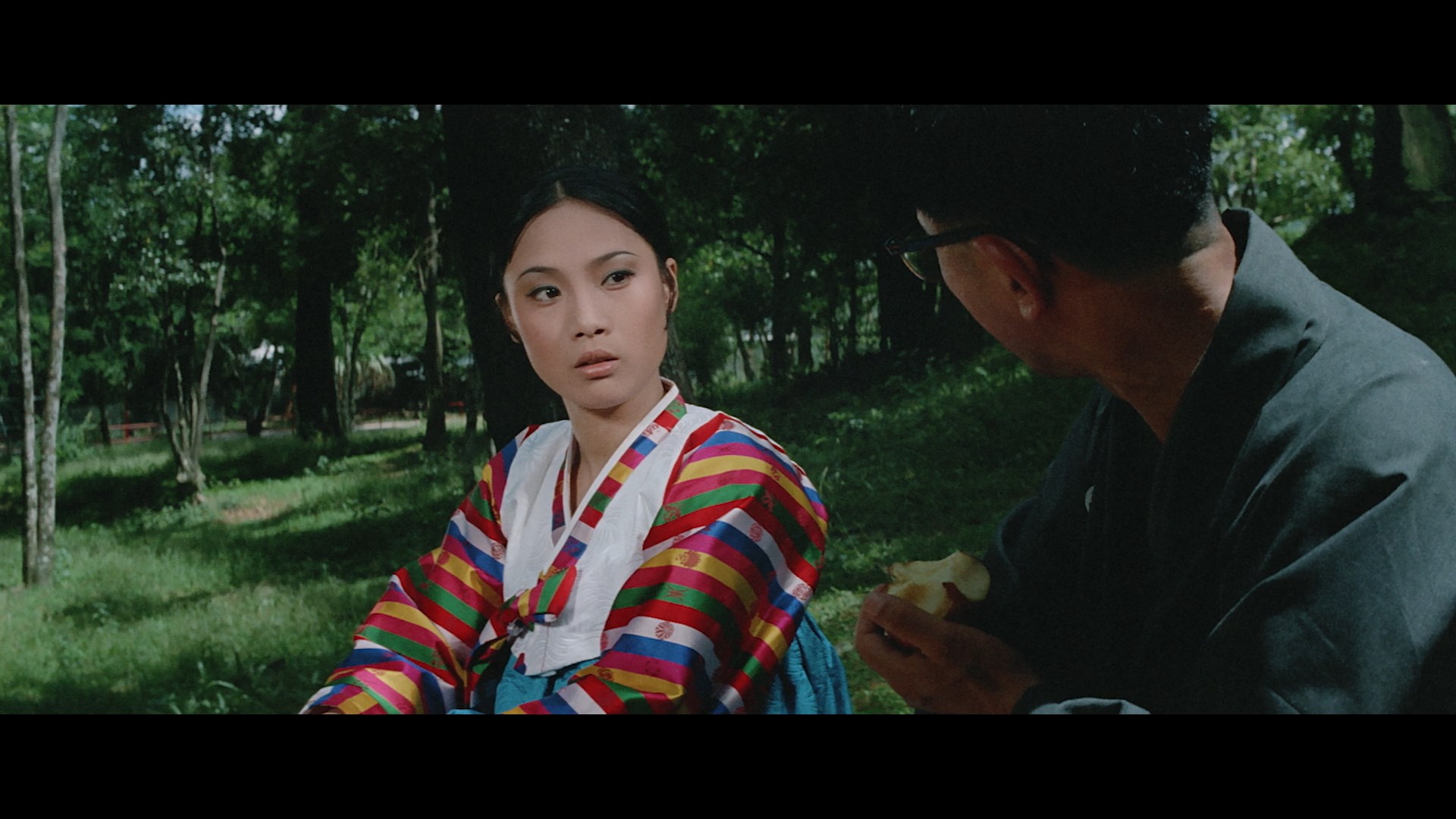 get taken way, way too far, and our heroine has to spring into action to get even and take a stand for the teachings
get taken way, way too far, and our heroine has to spring into action to get even and take a stand for the teachings 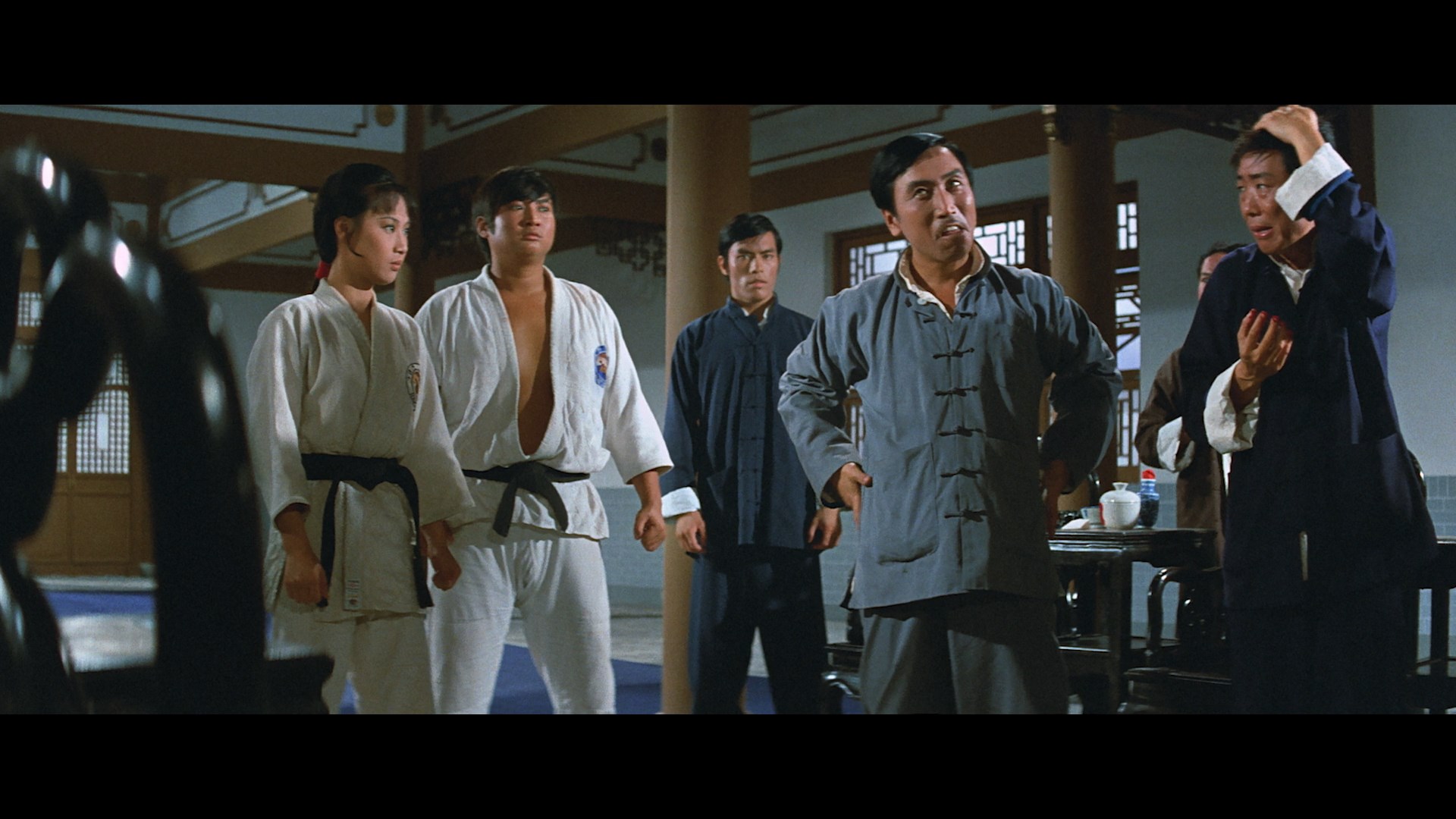 behind her entire life choice. This one turns out to be more complex and surprising than its companion feature, offering an interesting period view of the Japanese occupation and taking a couple of unexpected turns in the third act to keep you on your toes. Hung really gets to show off his stuff with the fight choreography here, and Mao is more than up to the task throughout. Again the soundtrack is a crazy one, this time assembled by someone very fond of their Emerson, Lake & Palmer collection.
behind her entire life choice. This one turns out to be more complex and surprising than its companion feature, offering an interesting period view of the Japanese occupation and taking a couple of unexpected turns in the third act to keep you on your toes. Hung really gets to show off his stuff with the fight choreography here, and Mao is more than up to the task throughout. Again the soundtrack is a crazy one, this time assembled by someone very fond of their Emerson, Lake & Palmer collection.
Both of these Golden Harvest productions have been readily available on home video in various editions over the years including Hong Kong DVDs from Fortune Star and a 2014 double feature DVD from Shout! Factory. The Blu-ray editions (which are identical in the U.S. and U.K. apart from the packaging, company logos, and menus) easily best their predecessors with beautiful transfers that make the most out of colorful albeit occasionally inconsistent elements. Each film comes with LPCM 1.0 Mandarin audio with optional, newly translated English subtitles, plus the entertaining English dubs which often simplify the story and characters to an insane degree. Hapkido also tosses in the alternate U.S. English dub and the2006 5.1 DVD dub for good measure. Lady Whirlwind sports no less than three(!) audio commentaries: Frank Djeng and Robert "Bobby" Samuels, Djeng and Michael Worth, and Samm Deighan solo. The Djeng-Samuels and Djeng-Worth also provide commentaries for Hapkido, and each combo works well as a double feature commentary running 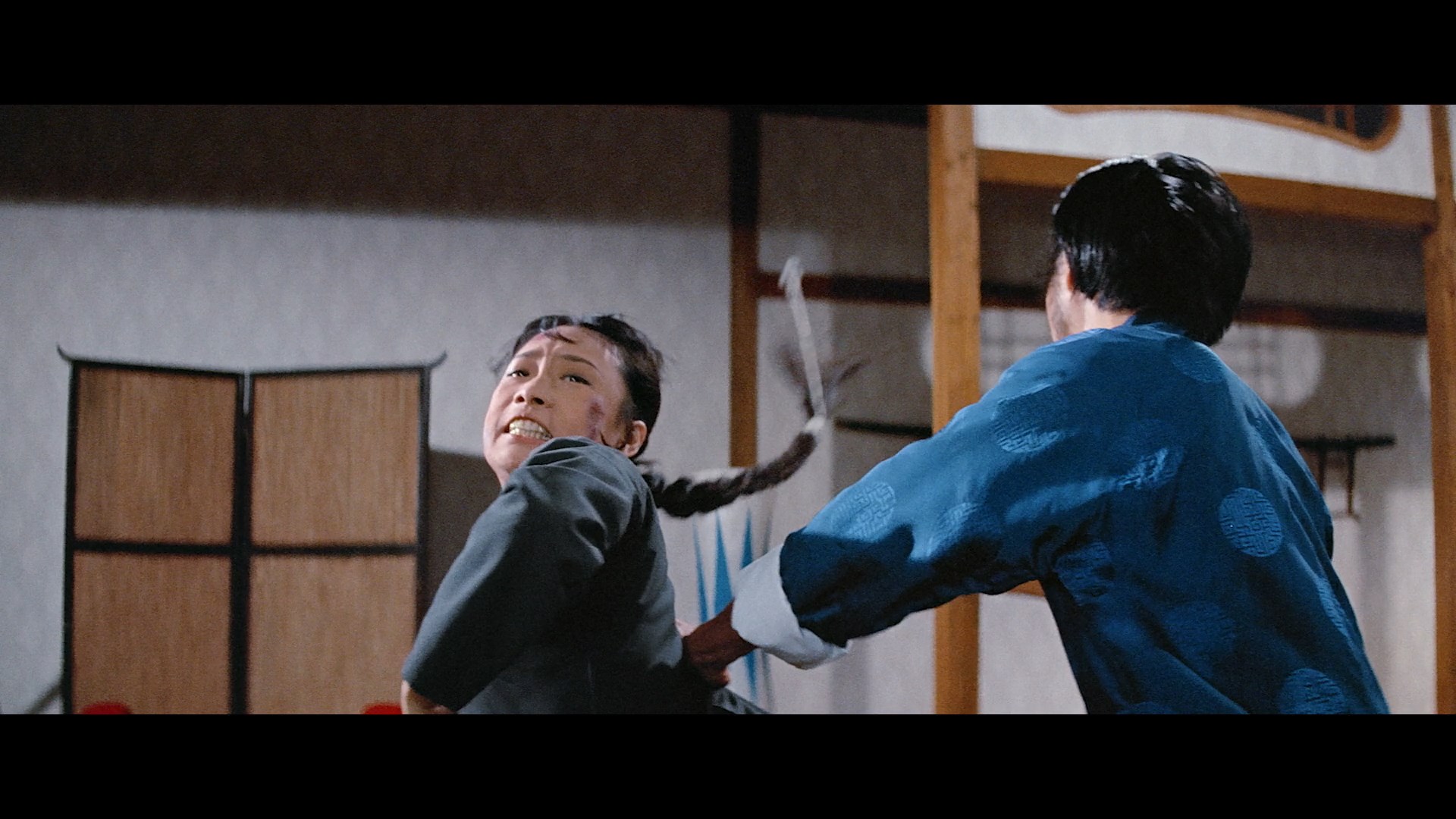 through the ins and outs of Mao's career, Golden Harvest, Hung's work behind and in front of the camera, the bit players, historical context, and tons more. Samm Deighan provides a strong third commentary for Lady Whirlwind, focusing primarily on Mao and her
through the ins and outs of Mao's career, Golden Harvest, Hung's work behind and in front of the camera, the bit players, historical context, and tons more. Samm Deighan provides a strong third commentary for Lady Whirlwind, focusing primarily on Mao and her 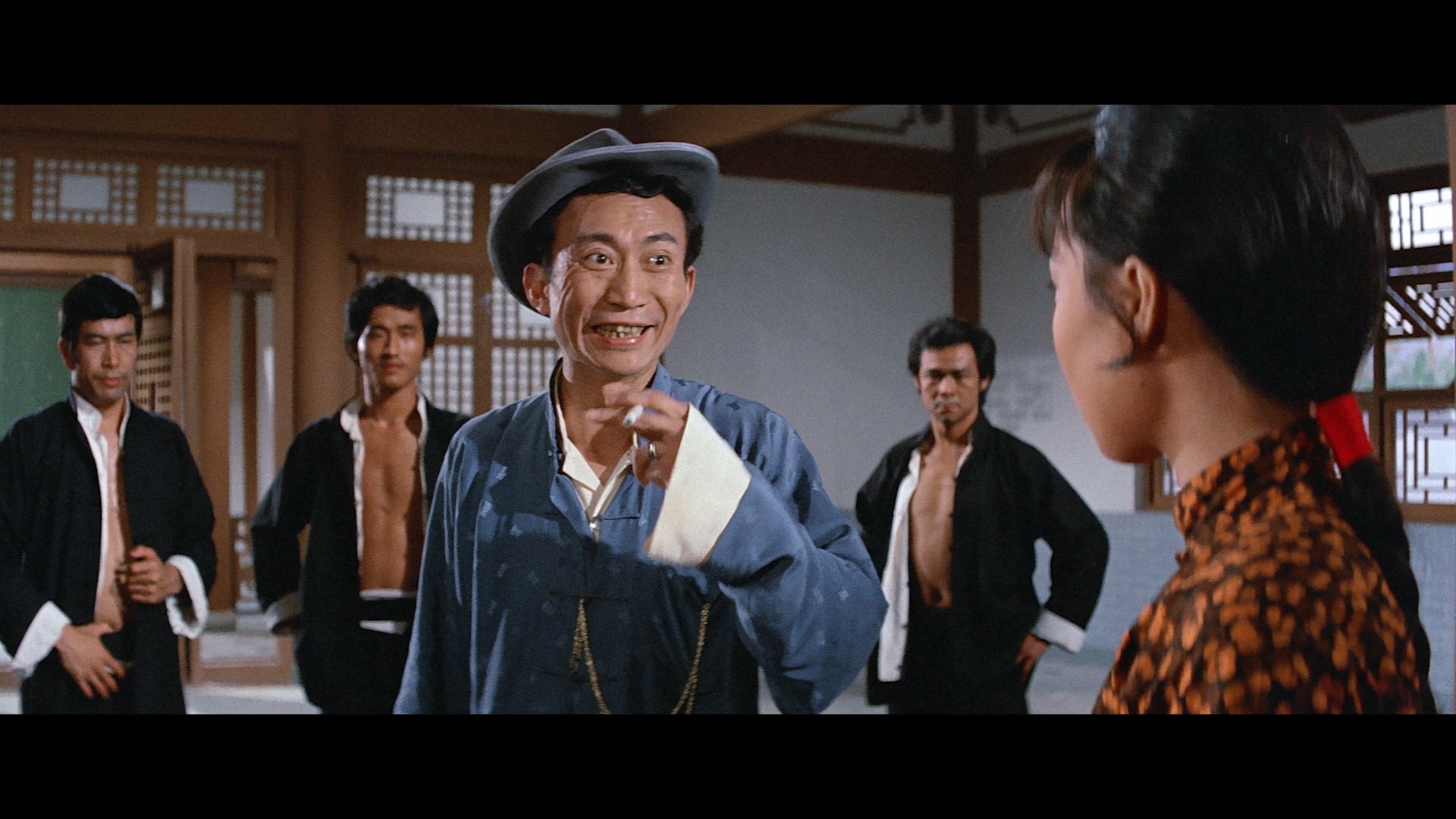 impact on action cinema as well as the misleading U.S. ad campaign and the depictions of female action stars in Hong Kong cinema during the late '60s and '70s within and outside of Golden Harvest.
impact on action cinema as well as the misleading U.S. ad campaign and the depictions of female action stars in Hong Kong cinema during the late '60s and '70s within and outside of Golden Harvest.
On-camera interviews with Mao have been sparse over the years, but a terrific new two-part chat with her is included here spread over both discs: "Lady Whirlwind Speaks" (13m19s) and "Lady Kung Fu Speaks" (18m1s) in which she talks about her childhood background doing Peking Opera, her entry in films and how she met her directors, her experiences at Golden Harvest, the influence of watching Shaw Brothers movies, being asked to work with Bruce Lee, and her decision to walk away from her film career to focus on her family and business pursuits outside of Hong Kong. Lady Whirlwind also features "Kung Fu Cooking" (31m49s), in which Djeng has an extensive conversation with one of Mao's sons, Thomas King, about how the family became aware of her cinematic fame thanks to New York TV airings of kung-fu movies and what she's like as a person. Don't miss the scene-stealing Cocker Spaniel trotting around, too. Also included are the alternate Lady Whirlwind English credits sourced from VHS, a gallery of 26 images, and the Hong Kong and U.S. trailers plus a U.S. radio spot. On Hapkido you'll also find archival SD interviews with Mao (16m59s), Wong (17m1s), and Hung and Biao (9m21s), plus a fun featurette (6m40s) created by Golden Harvest to promote the film showing hapkido master Ji Han-jae teaching the lead actors hapkido, looking great here in a new 2K restoration. Also included are alternate opening credits sequences (textless, English, and U.S.), the Hong Kong Mandarin English trailers, the U.S. trailer and TV spot, and a 67-image gallery. The first pressing also comes with an insert booklet containing a new essay on the films by James Oliver.
Reviewed on January 26, 2023.



 international smash Enter the Dragon and its posthumous cementing of
international smash Enter the Dragon and its posthumous cementing of  Bruce Lee as an all-time screen legend, seemingly everyone involved with the film seemed to be brushed with cinematic gold dust for a while. That was definitely the case for Angela Mao, who steals a lengthy chunk of the film in an action-packed flashback as Lee's ill-fated sister fending off an army of attackers. One of the first major female martial arts stars and an early adopter of hapkido, the Taiwanese actress parlayed her discovery by producer Raymond Chow into a successful career (including multiple stints opposite a young Jackie Chan) before retiring in the early '80s and moving to America. The year of Enter the Dragon's release, 1973, saw a slew of Mao releases like When Taekwondo Strikes, Thunderbolt, and Deadly China Doll, and two of her most popular vehicles have been given the deluxe special edition treatment on Blu-ray from Eureka in the U.K. and Arrow Video in the U.S. with new 2K restorations by Fortune Star.
Bruce Lee as an all-time screen legend, seemingly everyone involved with the film seemed to be brushed with cinematic gold dust for a while. That was definitely the case for Angela Mao, who steals a lengthy chunk of the film in an action-packed flashback as Lee's ill-fated sister fending off an army of attackers. One of the first major female martial arts stars and an early adopter of hapkido, the Taiwanese actress parlayed her discovery by producer Raymond Chow into a successful career (including multiple stints opposite a young Jackie Chan) before retiring in the early '80s and moving to America. The year of Enter the Dragon's release, 1973, saw a slew of Mao releases like When Taekwondo Strikes, Thunderbolt, and Deadly China Doll, and two of her most popular vehicles have been given the deluxe special edition treatment on Blu-ray from Eureka in the U.K. and Arrow Video in the U.S. with new 2K restorations by Fortune Star. Hung) as organized crime is ruling a town with an iron fist including its latest victim, Ling (Yi), who's beaten senseless and vows payback. That proves extremely complicated with the appearance of Tien (Mao), whose sister killed herself after being
Hung) as organized crime is ruling a town with an iron fist including its latest victim, Ling (Yi), who's beaten senseless and vows payback. That proves extremely complicated with the appearance of Tien (Mao), whose sister killed herself after being  dumped by Ling. Now she's determined to make him pay with his life, but he talks her into holding off until his own quest for satisfaction is completed. Cue the showdowns, conflicted loyalties, and inevitable finale in which Tien has to decide whether to fulfill her own vow. It isn't hard to see why this one got exported so widely since it ticks off all the martial arts '70s boxes with a fight scene every ten minutes or so, with no visual or narrative innovations in sight to get in the way. It's also worth noting that this was shot with what look like outdated anamorphic lenses, similar to what you'd see in early CinemaScope titles, with actors on the periphery of wide shots looking very squeezed and occasional inherent focus issues popping up. That's a shortcoming inherent in the original film, so any widescreen version since then has had it. Also worth noting is the patchwork soundtrack, which is stranger than usual thanks to its generous recycling of Michel Legrand's score for The Picasso Summer.
dumped by Ling. Now she's determined to make him pay with his life, but he talks her into holding off until his own quest for satisfaction is completed. Cue the showdowns, conflicted loyalties, and inevitable finale in which Tien has to decide whether to fulfill her own vow. It isn't hard to see why this one got exported so widely since it ticks off all the martial arts '70s boxes with a fight scene every ten minutes or so, with no visual or narrative innovations in sight to get in the way. It's also worth noting that this was shot with what look like outdated anamorphic lenses, similar to what you'd see in early CinemaScope titles, with actors on the periphery of wide shots looking very squeezed and occasional inherent focus issues popping up. That's a shortcoming inherent in the original film, so any widescreen version since then has had it. Also worth noting is the patchwork soundtrack, which is stranger than usual thanks to its generous recycling of Michel Legrand's score for The Picasso Summer. get taken way, way too far, and our heroine has to spring into action to get even and take a stand for the teachings
get taken way, way too far, and our heroine has to spring into action to get even and take a stand for the teachings  behind her entire life choice. This one turns out to be more complex and surprising than its companion feature, offering an interesting period view of the Japanese occupation and taking a couple of unexpected turns in the third act to keep you on your toes. Hung really gets to show off his stuff with the fight choreography here, and Mao is more than up to the task throughout. Again the soundtrack is a crazy one, this time assembled by someone very fond of their Emerson, Lake & Palmer collection.
behind her entire life choice. This one turns out to be more complex and surprising than its companion feature, offering an interesting period view of the Japanese occupation and taking a couple of unexpected turns in the third act to keep you on your toes. Hung really gets to show off his stuff with the fight choreography here, and Mao is more than up to the task throughout. Again the soundtrack is a crazy one, this time assembled by someone very fond of their Emerson, Lake & Palmer collection. through the ins and outs of Mao's career, Golden Harvest, Hung's work behind and in front of the camera, the bit players, historical context, and tons more. Samm Deighan provides a strong third commentary for Lady Whirlwind, focusing primarily on Mao and her
through the ins and outs of Mao's career, Golden Harvest, Hung's work behind and in front of the camera, the bit players, historical context, and tons more. Samm Deighan provides a strong third commentary for Lady Whirlwind, focusing primarily on Mao and her  impact on action cinema as well as the misleading U.S. ad campaign and the depictions of female action stars in Hong Kong cinema during the late '60s and '70s within and outside of Golden Harvest.
impact on action cinema as well as the misleading U.S. ad campaign and the depictions of female action stars in Hong Kong cinema during the late '60s and '70s within and outside of Golden Harvest. ![]()